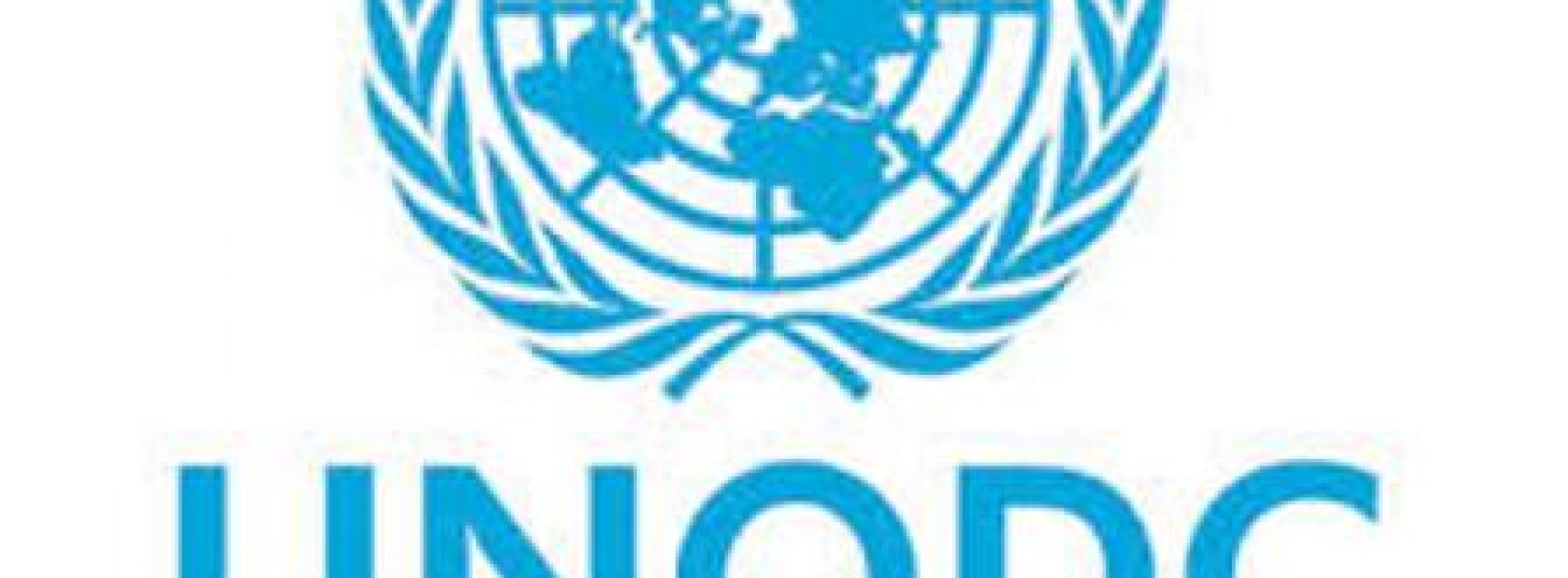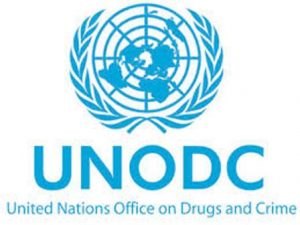We didn’t tell Nigeria to legalise cannabis – UNODC
• Refutes Media reports
The United Nations Office on Drugs and Crime (UNODC) has denied media reports that it called for the decriminalization of Cannabis in Nigeria in its presentation to the Nigerian Senate on Monday.
In a statement today in Abuja the UNODC said during its visit to Senate Committee on Drugs and Narcotics, Abuja at which it made a presentation at the public hearing on ‘The need to check the rising menace of pharmaceutical drugs abuse amongst youth in Nigeria’ on 26 March, 2018, it never said what was reported in the media.
According to the Outreach and Communications Officer, Mr. Sylvester Atere, the news totally misquoted the UNODC views and warned that this could jeopardize the long existing relationship with Nigeria.
“To keep the record straight, on invitation by the Senate Committee on Drugs and Narcotics, UNODC made a presentation at the public hearing and reiterated the following recommendations contained in 2017 International Narcotics Control Board (INCB) report, where the Board urges all Governments to:
• Gather data on prevalence of drug-use disorders and the accessibility and utilization of treatment;
• Invest in making treatment and rehabilitation evidence-based;
• Allocate sufficient resources to treatment and rehabilitation, the two major components of demand reduction;
• Pay particular attention to special population groups;
• Share, nationally and internationally, best practices and build capacity;
• Stimulate research into new interventions.
On being asked specifically on cannabis, he said “our representative clearly stated that legalization of Cannabis is not supported by the three UN international drug conventions (Single Convention on Narcotic Drugs, 1961 as amended by the 1972 Protocol; Convention on Psychotropic Substances, 1971; UN convention against Illicit Traffic in Narcotic Drugs and Psychotropic Substances 1988). The UNODC did not urge Nigeria to legalize cannabis.”
See Memorandum Below:
Memorandum by:
United Nations Office on Drugs and Crime (UNODC)
To the Public Hearing on a
Motion on the Need to Check the Rising Menace of Pharmaceutical Drug Abuse
among Youths in Nigeria
Date: 26 March 2018
Venue: Senate Chambers, National Assembly
Background
The use of mood-altering psychoactive substances has been part of human civilizations for millennia. For certain substances or in certain contexts it can assume a pathological pattern that needs to be addressed. Throughout the history of human civilization, societies have displayed varying levels of tolerance and permissiveness towards, and control over, the use of psychoactive substances. Some of those substances, such as tobacco and alcohol, have been regulated more or less strictly in most societies. Other substances have been judged harmful and hence have been placed under strict control. This is the case for narcotic drugs and psychotropic substances controlled under the international drug control conventions.1
Irrespective of the level of control, regulation and societal approval or disapproval, one factor common to all psychoactive substances is their propensity to lead to drug use disorders following frequent use. Drug use disorders are associated with significant levels of disease (morbidity) and disability, constitute a burden on national resources, and cause immeasurable human suffering. The World Health Organization (WHO) estimates that the global burden of disease attributable to alcohol and illicit drug use amounts to 5.4 per cent of the total burden of disease.2
Abuse of Pharmaceutical Drugs in Nigeria
Individual reported cases and anecdotal evidence suggest that there has been a rise in the non-medical use of pharmaceutical preparations among Nigerian youths. However, this position is not yet backed up by statistics. The United Nations Office on Drugs and Crime (UNODC) together with the Federal Ministry of Health (FMOH) and other national partners conducted a National Drug Use Survey between
2016 and 2017 to establish by evidence what the actual situation of drug use in Nigeria is. The report of the study, which was funded by the European Union (EU) is expected to be available by the middle of 2018. The results of the National Drug Use Survey will assist policymakers in identifying which drugs are used, the geography of use and the prevalence of drug use. With this evidence, policymakers will be better able to make informed and targeted interventions to address issues identified by the study.
Reports from Nigerian drug regulatory agencies and reports in the media suggest that the two most abused pharmaceutical products abused in Nigeria are Codeine and Tramadol. According to the Nigerian Epidemiological Network on Drug Use (NENDU) of the patients who entered treatment for opioid use 69% were using tramadol and 21% were using codeine3
These drugs are reported to be abused for their narcotic effects and among the so called “legal highs”, as they are still legally authorized for the medical use in Nigeria. These two drugs are also not under the international control,
which is monitored by the International Narcotics Control Board. There is also evidence of significant seizures of Tramadol at sea ports and warehouses by Nigerian drug control agencies as well as byn similar agencies in Ghana and Niger.
The Government of Nigeria has expressed concern over the abuse of Codeine and Tramadol, including at the Senate Roundtable on Drug Abuse in December 2017, in Kano. However, despite these legitimate concerns, the Government of Nigeria should also to take into consideration the medical needs like clinical pain treatment requirements of its citizens. There are cancer related pains, and non-cancer
related pain including osteoarthritis, chronic back pain, neuropathic pain, fibromyalgia. Available data suggests that Nigeria is under-supplied with pain medication.
Therefore, there is a need to strike a balance between government policy providing for adequate access to pain medication and stricter controls of pain medication including Codeine and Tramadol.
Cost-Benefit Considerations
Before increasing controls on any otherwise licit pain medication being diverted and used for non-medicalpurposes each country needs to do a cost benefit analysis. In conducting this cost benefit analysis the following need to be taken into consideration:
(a) Persons suffering from pain requiring access to pain medication;
(b) Availability of alternative pain medication of the same classification;
(c) Cost of the available alternative pain medication;
(d) Whether the available alternative could also be misused;
(e) Potential of creating underground markets if legitimate access to pain medication is denied and the related organized crime which may result to feed such underground markets;
(f) Scientific quantification and estimates of the pain medication requirements of the country;
(g) Adequacy of the current regulations for the monitoring and control of the distribution of pain medication;
(h) Adequacy of the resourcing and funding of regulatory agencies to carry out routine and non-routine inspection and monitoring of legitimate distribution chains and outlets of pain medication
Legal Framework for Control of Pharmaceutical Narcotic Drugs in Nigeria
Nigeria already has a robust legal framework for the control of pharmaceutical narcotic drugs. The National Agency for Food and Drug Administration and Control 4Act created the National Agency for Food and Drug Administration and Control (NAFDAC) and sets out its mandates to include, “undertake measures to ensure the use of narcotic drugs and psychotropic substances are limited to medical and
scientific purposes” [section 5(j) NAFDAC Act] and “collaborate with the National Drug Law Enforcement Agency in measures to eradicate drug abuse in Nigeria.” [Section 5(l) NAFDAC Act].These provisions already saddle NAFDAC with power to make policy and take measures to ensure the use of pharmaceutical narcotics solely for medical purposes.
Also, the Counterfeit and Fake Drugs and Unwholesome Processed Foods (Miscellaneous Provisions) Act provides for the following means of regulating the distribution and sale of medicines in general, including pharmaceutical narcotics:
• Prohibition of the display and sale of drugs in any unlicensed place including markets, kiosks, motor parks, road side stalls, in a bus or ferry or by way of street hawking [Section 2];
• Establishment of a Federal Task Force, chaired by NAFDAC, to coordinate the activities of State Task Forces in implementing the provisions of the Act;
• Establishment of State Task Forces to among other things inspect premises where drugs are sold, inspect registers for the purposes of monitoring legitimate distributions of drugs and minimizing diversion of drugs including pharmaceutical narcotics; and
• Establishment of a specialized Police Force Squad to assist the Federal Task Force in the enforcement of the Act.
These provisions clearly set out the required legislative and institutional frameworks to address the challenges of the diversion of pharmaceutical narcotics to non-medical uses. The only challenge seems to be in the implementation of these provisions.
Recommendations
The UNODC reiterates the following recommendations contained in 2017 International Narcotics Control Board (INCB) report, where the Board urges all Governments to:
(a) Gather data on prevalence of drug-use disorders and the accessibility and utilization of treatment;
(b) Invest in making treatment and rehabilitation evidence-based;
(c) Allocate sufficient resources to treatment and rehabilitation, the two major components of demand reduction;
(d) Pay particular attention to special population groups;
(e) Share, nationally and internationally, best practices and build capacity; and
(f) Stimulate research into new interventions.
More specifically, the UNODC also recommends that the Government of Nigeria:
(a) Use the results of the National Drug Use Survey when published, as evidence to drive its Policy making;
(b) Make available adequate resources to the drug regulatory authorities to effectively implement the laws regulating the distribution and use of pharmaceutical narcotics;
(c) Provide adequate legislative oversight over Nigeria’s drug regulatory authorities to ensure the effective and efficient restriction of pharmaceutical narcotics to medical use only;
(d) Encourage the drug regulatory authorities to make regulations requiring all manufacturers and marketers of pharmaceutical narcotics to print labels warning users of the addictive nature and other medical side effects of the drugs. These messages should be field tested to ensure that they effectively communicate the required message; and
(e) Promote a nationwide campaign to sensitize the general public and vulnerable populations on the effect of non-medical use of pharmaceutical narcotics, including the possible inclusion of this in school health science curricula. Sensitization messages should also be developed using tested key messages, to specifically target parents, teachers and health care professionals who serve as role models. (UNODC, NDLEA, FMOE are currently doing a pilot of a sensitization programme on drug use which covers the risk related to the misuse of pharmaceuticals.
Elisabeth Bayer
Officer in Charge
UNODC – Nigeria







0 Comments
No Comments Yet!
You can be first to comment this post!